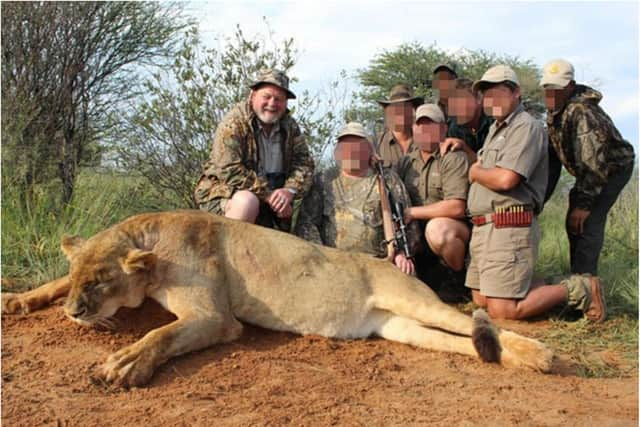Doncaster businessman pictured with slaughtered lion exposed in new book
and live on Freeview channel 276
David Watt, 72, is named in a new book, Trophy Hunters Exposed: Inside the Big Game Industry which describes how British people arrange for clients to shoot animals including elephants, lions, and rhinos in South Africa.
The book, authored by Eduardo Goncalves, founder of the Campaign To Ban Trophy Hunting, comes as the government awaits the results of a consultation on whether to ban hunters from importing any animals killed back to Britain.
Advertisement
Hide AdAdvertisement
Hide AdThere is no suggestion that any of the businessmen has done anything illegal, but recent years has seen growing public outcry amid campaigns against hunting as well as viral images showing trophy hunters posing with the bodies of animals.


According to the book, Mr Watt works as international client coordinator for Nduna Hunting Safaris.
Through him, customers can pay £240 to kill monkeys and up to £2,800 to shoot larger game, the book says.
They can also arrange to kill Africa's Big Five - lions, leopards, black rhinos, elephant and Cape buffalo - or to use packs of dogs to hunt wild cats.
Advertisement
Hide AdAdvertisement
Hide AdSpeaking to the Times, the former oil and gas executive said: “If a client wants to hunt a lion we can arrange it but we adhere to strict ethical rules and would never hunt anything endangered.
"The hunting does a lot of good for animal conservation and provides for the local community.”
Campaigners refute claims by hunters that the money generated by the practice helps to protect endangered animals.
“Trophy hunters are not experts in animal conservation. They enjoy shooting the animals for the thrill of it," Goncalves said.
Advertisement
Hide AdAdvertisement
Hide Ad"An animal that’s been bred in captivity and hunted in an enclosure, they are tame, not wild.
"If the hunting reserves were turned over to nature tourism it would be a lot better for conservation.
“Sometimes lions are being killed from yards away because they think the hunter is going to give them some food. It’s very cruel.”
Watt, who has worked at Nduna Safaris for 20 years, is one of seven British men named in the book.
Advertisement
Hide AdAdvertisement
Hide AdThe firm advertises hunts for lionesses and young males said to be “affordable” and “the hunt of a lifetime” and boasts of Watt’s “many years’ experience of travelling and working in Africa”.
“David will be pleased to arrange the necessary paperwork to bring your rifle to South Africa and provide a step by step guide,” it reads.
We have contacted Nduna Safaris and Mr Watt for comment without response.